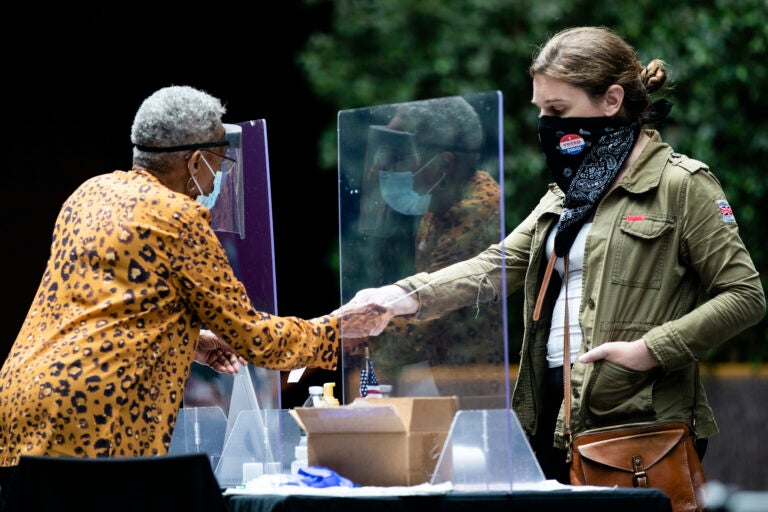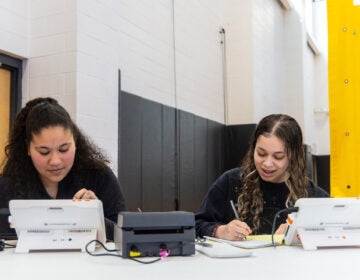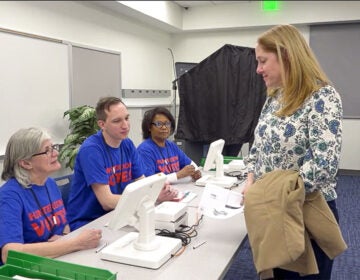How to be a poll worker in Pa., N.J. and Del.
Here’s what you need to know about how to be a poll worker in Pa., N.J. and Del. and how it's different from being a poll watcher.

A voter, right, checks in with an election worker before casting her ballot in the Pennsylvania primary in Philadelphia, Tuesday, June 2, 2020. (AP Photo/Matt Rourke)
Ask us: What do you want to know about voting and the 2020 election?
Even in a pandemic, democracy must carry on and county election officials in Pennsylvania, New Jersey and Delaware are working quickly to ensure a smooth Election Day on Nov. 3.
Key to doing that are poll workers and some places, like Philadelphia, are still looking to recruit thousands of them.
During the spring primaries, elections offices across the region saw their veteran poll workers call out in the spring over coronavirus concerns, which led to a consolidation of polling places and long lines in some locations. In Philadelphia, the average poll worker is 60 years old and therefore, more vulnerable to serious compilations from COVID-19.
To avoid a repeat, counties in the Philly region are recruiting for all the different roles poll workers can take — these are the clerks, machine inspectors and bilingual interpreters.
Here’s what you need to know.
What’s the difference between a poll worker and a poll watcher?
Poll watchers, also called “challengers” in states like Delaware and New Jersey, got a good deal of attention in the first presidential debate. During the event, President Donald Trump falsely claimed Philadelphia election officials had wrongly blocked poll watchers from the city’s new satellite voting locations — places where people can register to vote, then request, fill-out and submit mail-in ballots.
The first thing you need to know about poll watchers is that they are not the people helping work the polls. They’re appointed by a candidate or political party chair to observe a voting site for any irregularities. To find out how to become an appointed poll watcher, contact the local chapter of your political party.
These challengers have to be certified by their local county elections board and cannot actively interfere with voting. For example, say a certified poll watcher thinks someone is not qualified to vote, they have to approach the elections officials with their case — not the voter. Here’s the full set of rules poll watchers must follow in Pennsylvania.
As for the president’s false claims, elections officials told The Philadelphia Inquirer that so far, no poll watchers for the Trump campaign have been certified and even if they had, poll watchers don’t have the same rights at these satellite voting locations.
So what’s a poll worker and how do you become one?
These are the people who open polling locations, set up voting machines, answer voters’ questions and handle any day-of hiccups that might take place.
In Philadelphia, a poll worker can take one of six roles on the election board (each of the county’s more than 1,700 divisions has an election board).
Of the six roles available, three are voted in every four years, and the rest are appointed by the Philadelphia City Commissioners — these are the clerks, machine inspectors and bilingual interpreters.
All of the positions answer to the Judge of Elections, the highest-ranking poll worker, and help troubleshoot any problems that may arise on Election Day.
Other counties in the area use fewer poll workers per division, but the job roles are more or less the same.
Philadelphia is still looking to recruit up to 8,500 poll workers for Nov. 3, while other counties in the region (as we’ll explain further below) have finished recruiting.
This year, trainings will mostly be held online, but anyone who wants to attend an in-person training should be able to. Trainings have already started and will continue through mid-October.
To become a poll worker, first you need to submit an application or interest form to your local board of elections. You can also fill out Pennsylvania’s interest form, which is then sent to the appropriate county election officials.
Some forms will be more detailed than others. For example, Philadelphia’s online form asks you basic contact information while Pennsylvania’s interest form asks more detailed questions, including any additional skills you may bring to the polls, such as a second language.
Someone from your county elections office will get back to you if they need you. But it may take some time for counties that have a poll worker surplus.
What’s the time commitment?
On Election Day, Philadelphia poll workers arrive at their locations by 6:15 a.m. (at the latest) so they can open the polls at 7 a.m.
Workers must show up early so they can be sworn in, take the oath of office and set up the polling site. By the time the polls open, the workers should have made sure they have the right voting machine for their division; a working cell phone they’re assigned by the County Board of Elections, which is used for language interpretation services; and if a portable wheelchair ramp was delivered with the voting machine, it has to be in place by 7 a.m.
Workers do get breaks throughout the day, but they take place during lulls in voting and are assigned by the elections judge.
Polls close at 8 p.m. and you get to leave when you’re done securing voting materials, which is usually finished by 9:30 p.m.
How much are poll workers paid?
Poll workers do get paid for training and working on Election Day, but the amount varies by state and county.
In Philadelphia, the pay for the training is $50. You only get that payment if you work the polls on Election Day, though.
The election is a long day of work, but this year, workers will leave with a total of $250 (including the $50 for training), thanks to a hazard pay boost during the COVID-19 pandemic.
Who makes the perfect poll worker?
Philadelphia is pushing to recruit younger people because they’re less vulnerable to coronavirus complications. It’s also a way to recruit the future generation of poll workers.
In an ideal world, City Commissioner Omar Sabir said the final 8,500 poll workers will be a mix of new people who’ve never worked an election and veterans who can offer guidance and are familiar with how hectic the day can be even in the best conditions.
Other Pa. counties
Some counties report they are all set with recruitment. The only way to know is to visit your local county elections website.
For example, Montgomery County spokeswoman Teresa Harris said the county received an “overwhelming response” to their need for poll workers and Montco is no longer recruiting for that role.
In Bucks County, spokesman Larry King said they’re still taking applications, but the county is essentially set with workers and a pool of backups. Any new applications will likely be saved as backups to the backups or for the next election, King said.
What about Delaware?
New Castle has already recruited the 1,800 workers it needs — the state needs 3,200 workers total — but are taking backup applications mainly as a precaution.
The check-in time is 6 a.m. to open polls at 7 a.m.
Election inspectors make $235 for the day, judges make $195 and the clerks make $190. In Delaware, election inspectors are the highest-ranking poll worker and there are two of them — one for each major political party.
To apply, visit this link and download the poll worker application and send it to your county election office.
What about New Jersey?
People can apply to be poll workers — referred to as board workers in some counties — using this link at the Division of Elections website. The application is sent to the appropriate county elections office.
Be advised: Some counties, such as Camden County, say they are pretty much set with the workers and backups they need.
“That said, we always get callouts,” said Rich Ambrosino, Commissioner at the Camden County Board of Elections. “We’re always looking for more, we have a board worker application that people can fill out … submit it to us, we’ll schedule them for a training.”
And the county is always looking for bilingual Spanish-speakers and young people, said Ambrosino, paying poll workers $275 for the day. Same deal applies, however, these bilingual speakers open and close the polls.
Since every voter in New Jersey is automatically getting a mail-in ballot, Ambrosino said the poll worker job in the state might be mainly to take those ballots in for anyone who wants to drop them off in person.

Get daily updates from WHYY News!
WHYY is your source for fact-based, in-depth journalism and information. As a nonprofit organization, we rely on financial support from readers like you. Please give today.






